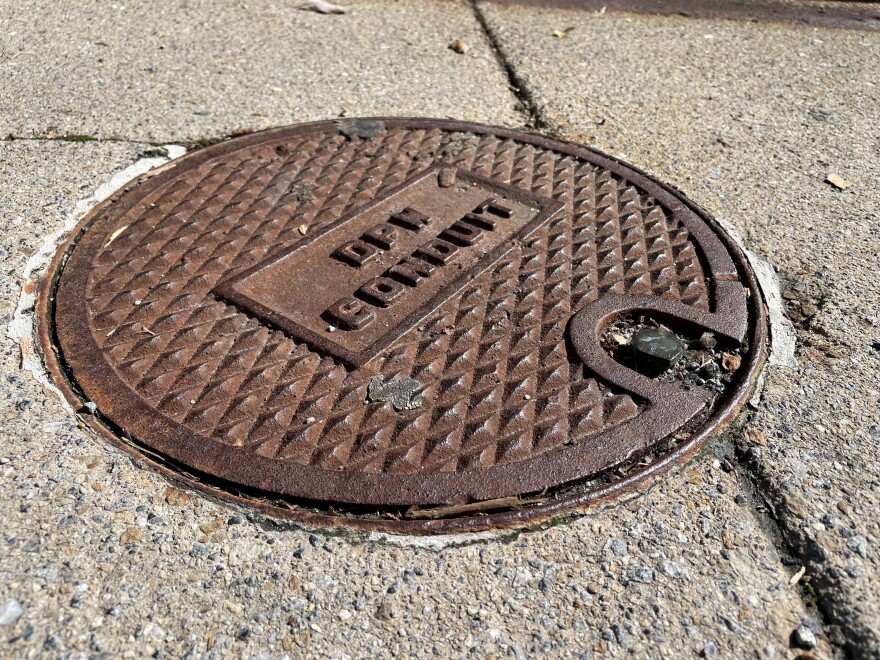Beneath the sprawling asphalt streets and concrete sidewalks across Baltimore City there’s a dusty and dark underground cavernous system known as the conduit. This oft obscure system serves a critical purpose for Baltimore residents, businesses and the city to function each day. It provides access for electricity to be routed for roughly half a million residents, individuals seeking internet access, street lights that keep blocks lit up at night and traffic signals that ensure motorists can travel safely.
Control over how to best care for this critical infrastructure, more than 100 years old, has laid bare political divisions between some of the city’s council members, both current and former, and the Mayor Brandon Scott administration.
At the crux of the issue is whether an arrangement already approved by Mayor Scott and his appointees would benefit all residents and businesses across the city and not just its largest user – Baltimore Gas and Electric – the monopoly that sells power to residents.
Baltimore City Council members grilled a Baltimore Gas and Electric representative and attorneys working on behalf of the Scott administration for nearly four hours on Thursday night.
Here’s what you need to know for background:
Earlier this month, Scott and his two appointees forced a vote approving an amended conduit agreement with BGE during the Board of Estimates meeting, the city’s spending board. In that agreement, the private utility – a subsidiary of publicly traded energy giant Exelon – will pay the city $134 million each year for capital improvements over the next four years. It will also pay $1.5 million for an occupancy fee each year during the course of that contract. That would be in lieu of BGE paying the city maintenance fees to invest in repairs across the 741-mile long underground tunnel system that would need upwards of $1 billion to overhaul.
Here’s three reasons why you should care:
- The outcome of the fight may affect your bill.
Councilmembers worry the power company will pass costs of improving the conduit system onto customers. During public comment, Christina Flowers from the Liberty Square neighborhood complained of BGE rate hikes.
“Every year since they’ve owned it, they’ve had tremendous amounts of hikes,” Flowers said.
Charles Washington, vice president of external and governmental affairs for BGE, countered that the approved deal reduces would save customers $50 million long-term.
As it stands, the company is still seeking an overall increase to the rate they would charge customers. Last week BGE filed its initial request to the state commission requesting a 5% increase to charge customers for gas and electricity over the next three years.
Bottom line: Will rates go up? Yes. But BGE argues that without the city’s agreement they would have gone up even higher.

- The system is really old and needs repairs no matter what happens
Before the city and BGE struck this deal, the city collected fees from all conduit users and maintained the conduit through its department of transportation.
Other conduit users Comcast, Quantum and Crown Castle, expressed concern over potential damage, and service disruptions that could occur when BGE begins repairing the conduit.
“The rights and interests of other conduit users must be protected,” said Kevin Brown, Quantum’s CEO. “We need a process to resolve damage claims and not just have to sue BG&E.”
Council member Isaac Schleifer harped on department leaders, wondering why the city was shifting maintenance duties to a private company.
“I’ve never heard anybody say the DOT’s conduit division is not performing at a high level,” Schleifer said. “If it's going well, why would we be changing that?”
Corren Johnson, interim director of the Baltimore City Department of Transportation, said the conduit division along with city inspectors would still be able to make repairs.
“This isn't a matter of them not performing. This is a matter of us trying to negotiate to get a higher rate,” Johnson said. “It is going to lessen the maintenance long term. The conduit division will be doing additional maintenance and capital improvements, separate from what BGE is doing.”
Council member Schleifer replied, “This is a tremendous gamble, for a little extra money.”
Bottom line: Baltimore City still owns the conduit and can make repairs and is betting that the approved agreement is a good deal for city residents.

- Officials worry about BGE holding up its end of the voluntary minority and women-owned contracting goals.
Both advocates and elected officials argued that the contract does not require minority and women-owned businesses to have set aside agreements. The Scott administration countered that BGE is under contract to carve out 25% of the conduit repair costs for minority and women-owned businesses. But the fine print differs, according to State Sen. Antonio Hayes, who grilled city attorneys on the specifics earlier this week.
Beyond that, Kobi Little, president of the Baltimore NAACP, said the city should not have signed the multi-million dollar agreement with BGE due to a lawsuit by former employees who allege experiencing racial discrimination in the workplace.
“BGE has unresolved race issues,” Little said. “Before negotiations are complete, there must be a diversity and equity assessment.”
Charles Washington, the BGE representative, said while he cannot comment on pending litigation, BGE denounces racism.
He defended BGE’s minority contracting record saying the company consistently outperforms its goals. “BGE is a company where you will find over three fourths of our executives, including myself, are women or people of color,” said Washington.
Bottom line: Baltimore City attorney Stephen Salisbury told state lawmakers that the minority and women-owned business carve out in the Baltimore Gas and Electric deal with the city is a voluntary goal and advocates such as the NAACP are concerned that the business won’t hold up its end of the promise without legal protections.

What’s next?
City council members will meet on Feb. 28, next Tuesday, at 5 p.m. to further evaluate the deal.
Editor's Note: Digital news editor Kristen Mosbrucker-Garza contributed to this news story.








